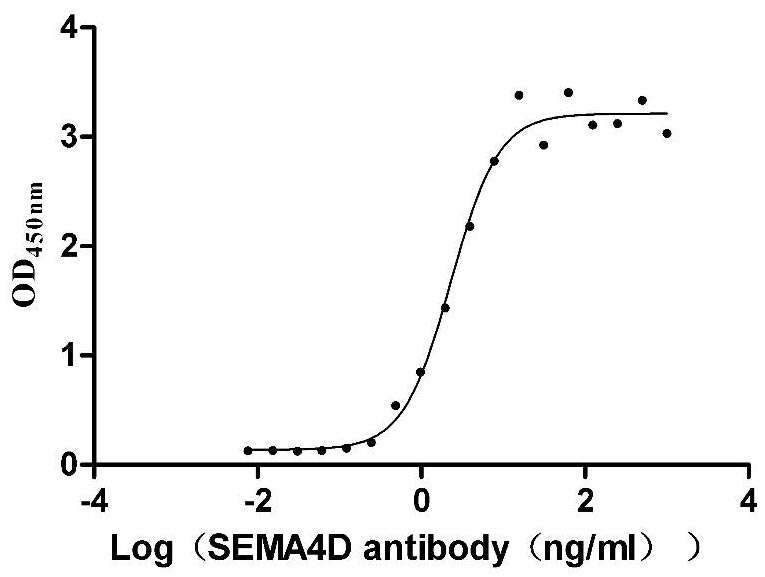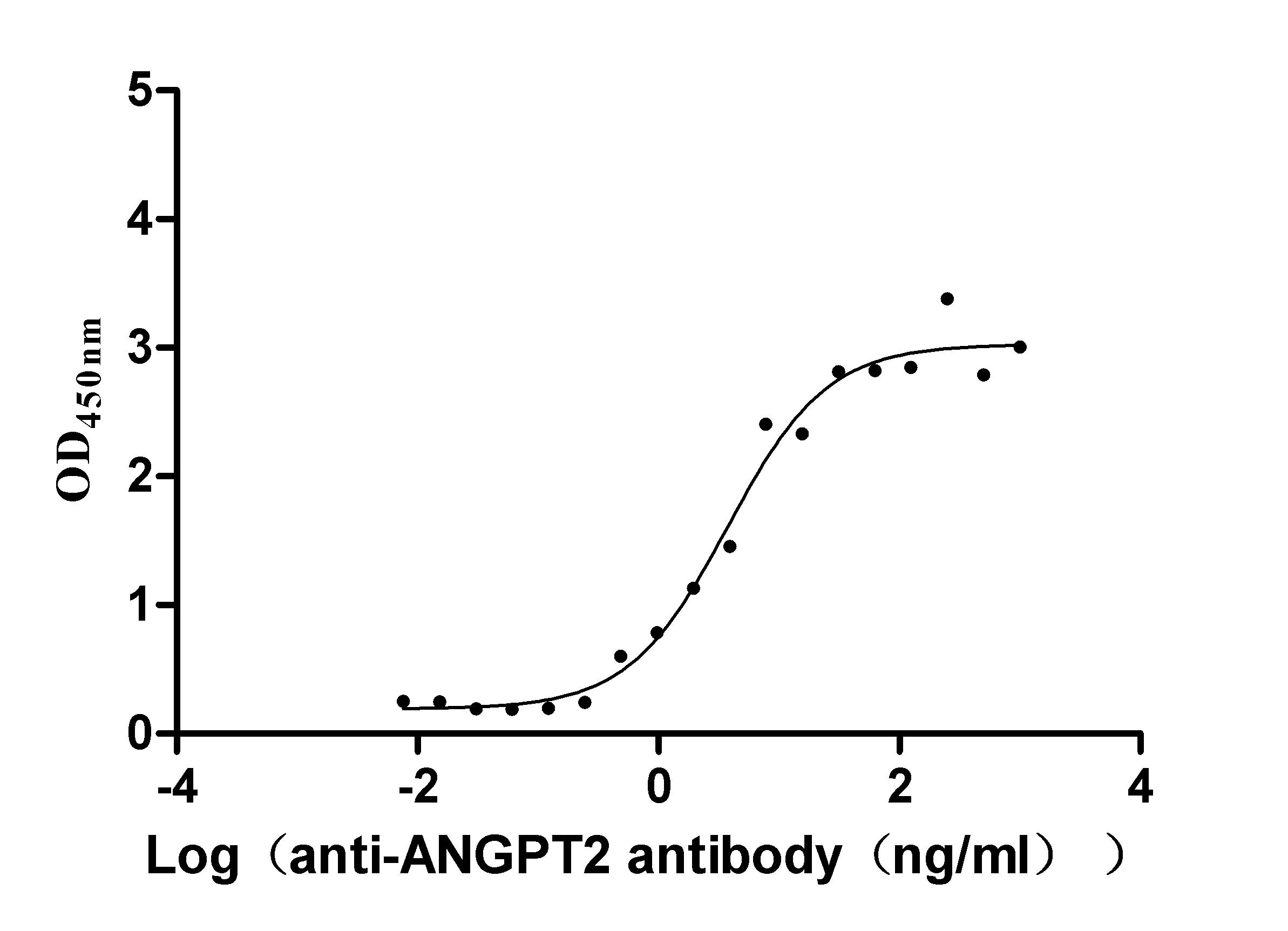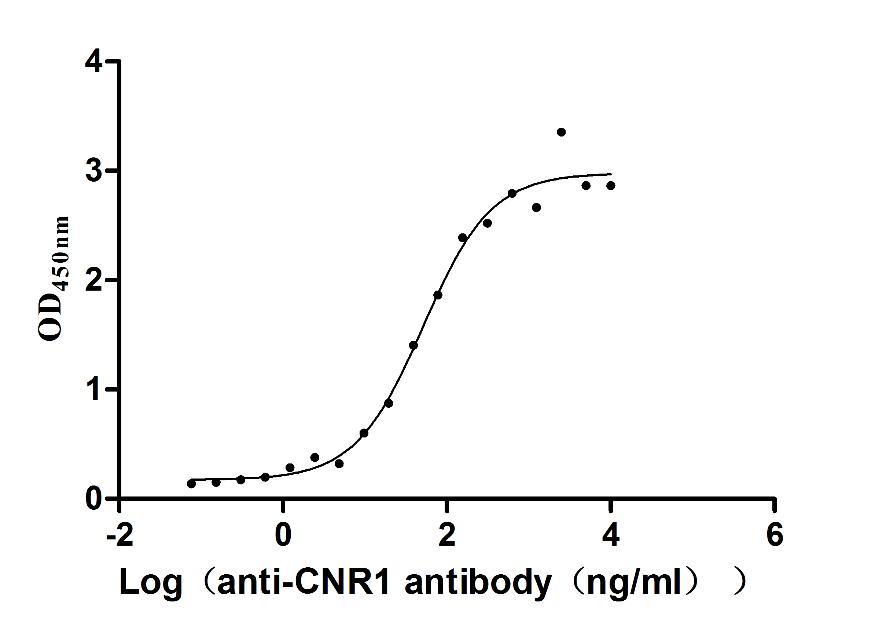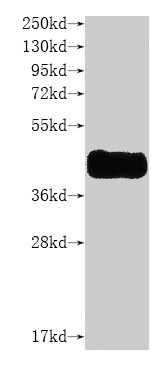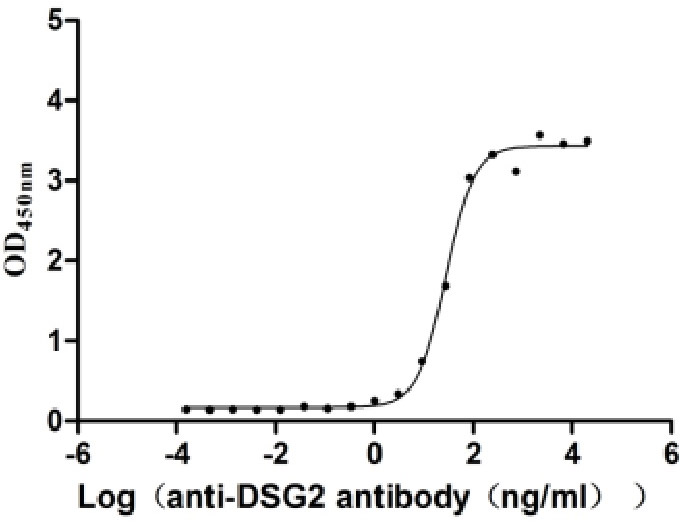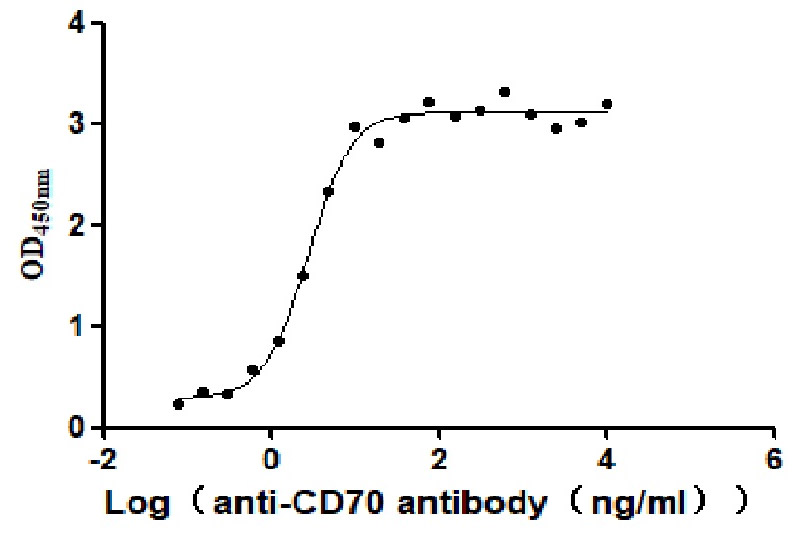Recombinant Human Syndecan-2 (SDC2)
-
货号:CSB-CF020889HU
-
规格:
-
来源:in vitro E.coli expression system
-
其他:
产品详情
-
基因名:SDC2
-
Uniprot No.:
-
别名:SDC2; HSPG1; Syndecan-2; SYND2; Fibroglycan; Heparan sulfate proteoglycan core protein; HSPG; CD antigen CD362
-
种属:Homo sapiens (Human)
-
蛋白长度:Full Length of Mature Protein
-
表达区域:19-201
-
氨基酸序列ESRAELTSDKDMYLDNSSIEEASGVYPIDDDDYASASGSGADEDVESPELTTSRPLPKILLTSAAPKVETTTLNIQNKIPAQTKSPEETDKEKVHLSDSERKMDPAEEDTNVYTEKHSDSLFKRTEVLAAVIAGGVIGFLFAIFLILLLVYRMRKKDEGSYDLGERKPSSAAYQKAPTKEFYA
Note: The complete sequence including tag sequence, target protein sequence and linker sequence could be provided upon request. -
蛋白标签:N-terminal 10xHis-tagged
-
产品提供形式:Liquid or Lyophilized powder
Note: We will preferentially ship the format that we have in stock, however, if you have any special requirement for the format, please remark your requirement when placing the order, we will prepare according to your demand. -
缓冲液:Lyophilized from Tris/PBS-based buffer, 6% Trehalose, pH 8.0
-
储存条件:Store at -20°C/-80°C upon receipt, aliquoting is necessary for mutiple use. Avoid repeated freeze-thaw cycles.
-
保质期:The shelf life is related to many factors, storage state, buffer ingredients, storage temperature and the stability of the protein itself.
Generally, the shelf life of liquid form is 6 months at -20°C/-80°C. The shelf life of lyophilized form is 12 months at -20°C/-80°C. -
货期:Basically, we can dispatch the products out in 1-3 working days after receiving your orders. Delivery time may differ from different purchasing way or location, please kindly consult your local distributors for specific delivery time.Note: All of our proteins are default shipped with normal blue ice packs, if you request to ship with dry ice, please communicate with us in advance and extra fees will be charged.
-
注意事项:Repeated freezing and thawing is not recommended. Store working aliquots at 4°C for up to one week.
-
Datasheet & COA:Please contact us to get it.
相关产品
靶点详情
-
功能:Cell surface proteoglycan that bears heparan sulfate. Regulates dendritic arbor morphogenesis.
-
基因功能参考文献:
- Methylation of SFRP1, SFRP2, SDC2, and PRIMA1 promoter sequences was observed in 85.1%, 72.3%, 89.4%, and 80.9% of plasma samples from patients with Colorectal cancer and 89.2%, 83.8%, 81.1% and 70.3% from adenoma patients, respectively. PMID: 28753106
- Emerging roles of SDC2 in epithelial and mesenchymal cancer progression has been summarized. (Review) PMID: 28940845
- data suggest that syndecan-2 induces extracellular shedding of E-cadherin and supports the acquisition of a fibroblast-like morphology by regulating MMP-7 expression in a colon cancer cell line PMID: 27270030
- SDC2 is overexpressed in Leri's pleonosteosis. The minor allele of a missense SDC2 variant, p.Ser71Thr, could confer protection against systemic sclerosis. PMID: 24442880
- In this review we considered the function of syndecan-2, the structure of syndecan-2 and its role in the formation of amyloid plaques. PMID: 25916113
- Extracellular matrix proteins expression profiling in chemoresistant variants of the A2780 ovarian cancer cell line. PMID: 24804215
- HIV matrix protein p17 is pro-fibrogenic through its interactions both with CXCR2 and syndecan-2 on activated HSCs PMID: 24736615
- The results demonstrate the importance of PDZ-binding domain of syndecan-2 for controlling LFA-1 affinity and cell adhesion. PMID: 24662262
- SDC2 expression was higher in skin melnaoma cells. It enhanced tyrosinase activity by increasing the membrane and melanosome localization of protein kinase CbetaII. UVB-induced up-regulation was required for UVB-induced melanin synthesis. PMID: 24472179
- syndecan 2 shows no changes associated to histological grade of Prostate cancer PMID: 24424718
- RhoA, but not RhoC was shown to be essential for the anchored phenotype of breast carcinoma cells that accompanied siRNA-mediated loss of syndecan-2. PMID: 24447566
- RKIP, LOX and SDC2 are coordinately regulated and collectively encompass a prognostic signature for metastasis-free survival in ER-negative breast cancer patients PMID: 23975428
- Taken together, these data suggest that IL-1alpha regulates extracellular domain shedding of syndecan-2 through regulation of the MAP kinase-mediated MMP-7 expression in colon cancer cells. PMID: 24613844
- Clinical validation of SDC2 methylation in serum DNA by quantitative methylation-specific PCR demonstrated a high sensitivity of 87.0% (95% CI, 80.0% to 92.3%) in detecting cancers. PMID: 23747112
- DNA from 4 HPV positive and 4 HPV negative fresh frozen primary HNSCC were subject to comprehensive genome-wide methylation profiling.Pathway analysis of 1168 methylated genes showed 8 signal transduction pathways (SDC2) of which 62% are hypermethylated. PMID: 23736812
- Taken together, these results suggest that the extracellular domain of syndecan-2 regulates the interaction of HCT116 human colon carcinoma cells with fibronectin. PMID: 23333331
- SDC-2 modulates TGFbeta2 transcriptional regulation via Smad2 signaling to facilitate fibrosarcoma cell adhesion. PMID: 23297089
- The repression of syndecan-2 by Wnt/beta-catenin/TCF signaling contributes to the resistance of osteosarcoma cells to doxorubicin. PMID: 22550000
- lower TCR/CD3 surface levels caused by syndecan-2 led to reduced TCR/CD3 responsiveness PMID: 22881146
- MC1R regulates melanoma cell migration via inhibition of syndecan-2 expression. PMID: 22493442
- SDC-2 is a novel (perineural) invasion-associated gene in PDAC which cooperates with K-ras to induce a more invasive phenotype. PMID: 22471946
- Notch receptors control their own activity by inducing the expression of syndecan-2, which then acts to propagate Notch signaling by direct receptor interaction. PMID: 22437834
- a specific glycochain is a receptor for dengue virus strain DEN2 16681 PMID: 22170634
- the data suggest that MMP-7 directly mediates shedding of syndecan-2 from colon cancer cells. PMID: 22227189
- Here the protein tyrosine phosphatase receptor CD148 is shown to be a key intermediary in cell adhesion to syndecan-2 extracellular domain, with downstream beta1 integrin-mediated adhesion and cytoskeletal organization. PMID: 21813734
- syndecan-2 was expressed preferentially in basal cells in benign tissue. In prostate cancer samples, syndecan 2 was expressed in granular-cytoplasmic localisation. PMID: 21317913
- HIV-1 p17 matrix protein interacts with heparan sulfate side chain of CD44v3, syndecan-2, and syndecan-4 proteoglycans expressed on human activated CD4+ T cells affecting tumor necrosis factor alpha and interleukin 2 production. PMID: 21482826
- the cytoplasmic domain of syndecan-2 regulates colon cancer cell migration via interaction with syntenin-1. PMID: 21569759
- The findings demonstrate that LRP1 and HSPG function in a cooperative manner to mediate cellular Abeta uptake and define a major pathway through which Abeta gains entry to neuronal cells. PMID: 21289173
- syndecan-2 and syndecan-4 regulate the compensatory effect of TG-FN on osteoblast cell adhesion and actin cytoskeletal formation in the presence of RGD peptides. PMID: 21036168
- RGD-independent cell adhesion via a tissue transglutaminase 2-fibronectin matrix promotes fibronectin fibril deposition and requires syndecan-4/2 and {alpha}5{beta}1 integrin co-signaling. PMID: 20929862
- Results support a potential role for syndecan-2 in pancreatic carcinogenesis and cancer progression. Expression of syndecan-2 might serve as a prognostic marker. PMID: 20683009
- Study results supported the potential role of SDC2 in prostatic carcinogenesis and cancer progression. PMID: 19786981
- these results suggest that syndecan-2 regulates cell migration of colon carcinoma cells through Tiam1-dependent Rac activation in colon cancer cells. PMID: 19962968
- syndecan's interactions with both CASK and neurofibromin are dependent on syndecan homodimerization. PMID: 20006588
- Identification of integrin alpha(M)beta(2) as an adhesion receptor on human peripheral blood monocytes for Cyr61 and connective tissue growth factor: immediate-early gene products expressed in atherosclerotic lesions.(integrin alpha(M)beta(2)) PMID: 12036876
- role in mediating adhesion and proliferation of colon carcinoma cells PMID: 12055189
- Ezrin N-terminal domain binds to the syndecan-2 cytoplasmic domain with an estimated K(D) of 0.71 microM and without the requirement of other proteins PMID: 12860416
- Mechanisms for the regulation of HSPG have been studied. PMID: 12860968
- Interleukin-8 binds to syndecan-2 on vascular endothelial cells. PMID: 14527339
- the HSPG T allele is a risk factor for the development of severe diabetic nephropathy in type 2 diabetic patients PMID: 14674716
- Syndecan-2 induces osteoblastic cell apoptosis through the JNK/Bax apoptotic pathway and the cytoplasmic domain of syndecan-2 is required for this action. PMID: 15936998
- the transmembrane domains are sufficient for inducing dimerization and transmembrane domain-induced oligomerization is crucial for syndecan-2 and syndecan-4 functions PMID: 16253987
- molecular complex most likely to obstruct RACK1 for functional attachment at syndecan-2, as revealed in cells transfected with oncogenic ras PMID: 16997272
- HSPGs are expressed on the membrane of myeloid leukemic cell lineages. PMID: 17035092
- heparanase-1 expression and heparan sulphate proteoglycan degradation are induced by estradiol in human endometrium PMID: 17261577
- these data suggested that both HSPG and CD81 are important for HCV entry. PMID: 17457918
- HSPG modulation of BMP signaling in myositis ossificans cells is reported. PMID: 17516498
- syndecan-2 acts as a suppressor for MMP-2 activation, causing suppression of metastasis PMID: 17623663
- There are pronounced tubulointerstitial HSPG alterations in primary kidney disease, which may affect the inflammatory response. PMID: 18032547
显示更多
收起更多
-
亚细胞定位:Membrane; Single-pass type I membrane protein.
-
蛋白家族:Syndecan proteoglycan family
-
数据库链接:
HGNC: 10659
OMIM: 142460
KEGG: hsa:6383
STRING: 9606.ENSP00000307046
UniGene: Hs.1501
Most popular with customers
-
Recombinant Human CD40 ligand (CD40LG), partial (Active)
Express system: Mammalian cell
Species: Homo sapiens (Human)
-
Recombinant Human Pro-neuregulin-1, membrane-bound isoform (NRG1), partial (Active)
Express system: Mammalian cell
Species: Homo sapiens (Human)
-
Recombinant Macaca mulatta Semaphorin-4D isoform 1 (SEMA4D), partial (Active)
Express system: Mammalian cell
Species: Macaca mulatta (Rhesus macaque)
-
Recombinant Dog Angiopoietin-2 (ANGPT2) (Active)
Express system: Mammalian cell
Species: Canis lupus familiaris (Dog) (Canis familiaris)
-
Recombinant Human Cannabinoid receptor 1 (CNR1)-VLPs (Active)
Express system: Mammalian cell
Species: Homo sapiens (Human)
-
Recombinant Human C-C chemokine receptor type 8 (CCR8)-VLPs (Active)
Express system: Mammalian cell
Species: Homo sapiens (Human)
-
Recombinant Human Desmoglein-2 (DSG2), partial (Active)
Express system: Mammalian cell
Species: Homo sapiens (Human)
-
Recombinant Human CD70 antigen (CD70), partial (Active)
Express system: Mammalian cell
Species: Homo sapiens (Human)


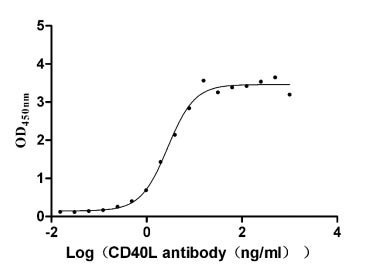
-AC1.jpg)
